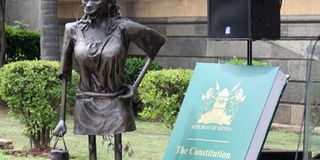Governors deserve respect, not criticism

It is vital to appreciate that the preparation of the 2010 Constitution engaged some of the sharpest minds in the land for 10 or so years. FILE PHOTO | WILLIAM OERI |
What you need to know:
- Both Houses of Parliament should change their attitude and embark on legislation aimed at enhancing the effectiveness of governors.
- This simple action of treating governors with reverence will pass a message to foreigners that Kenyans have confidence in governors.
Before introducing an amendment to the 2010 Constitution, it is vital to appreciate that the preparation of this document engaged some of the sharpest minds in the land for 10 or so years.
Afterwards, the drafting team decided to reduce, increase, or transfer powers of some offices and institutions while introducing new centres of power.
With good reason, the drafters abolished or significantly reduced, discretionary powers enjoyed by the presidency, the provincial administration, ministers, and others.
At county level, this group established the office of governor while ensuring the new position enjoyed enhanced political legitimacy. The governor was assigned the task of superintending over the social-economic transformation of rural Kenya.
These reformers had a clear mission: Establish a pragmatic grassroots government capable of addressing the challenges that have dogged past administrations for so long: ignorance, poverty and disease.
LOCAL ELITE
Despite five decades of Independence, the average citizen has achieved only marginal political, social, and economic progress owing to the remoteness and over-centralisation government.
The real change that devolution brought about is placement of the local elite in a vintage position to identify problems, propose solutions and make decisions.
As a result, rural access roads are now passable, local dispensaries operate meaningfully, water supply systems are working, and devolved funds are trickling down to people. Real change has come.
From the beginning, the Constitution drafters knew the bullying nature of established government institutions often directed towards emerging power centres, such as the ongoing onslaught targeting governors today.
Consequently, they sought to bar potential bullies from initiating legislation calculated at subverting county governments.
Despite this protection, both the National Government and Parliament hold the outmoded view that only they should lord it over all other institutions in the country.
UNDUE HARASSMENT
Consequently, emerging power centres such as governors must be humiliated, criticised, ostracised and finally stripped of trappings of power and prestige such as hoisting of national flags and image-enhancing titles such as ‘Your Excellency’.
At the national level, many key officials hoist the flag on their official vehicles without attracting undue harassment. They include Cabinet secretaries, the Chief Justice, Speakers of Houses of Parliament, service chiefs, etc.
National officials, particularly MPs, must learn that the time has come when certain positions in the counties are elevated well above those at national level.
Indeed, now is the moment to attract the best brains across the board to seek gubernatorial positions to tackle challenges that have eluded past administrations.
CHANGE THEIR ATTITUDE
Both Houses of Parliament should change their attitude and embark on legislation aimed at enhancing the effectiveness of governors such as protection from errant county assemblies, and giving them powers to serve as chief executive officers.
Governors should be able to stop any county official bent on abuse of finances or anyone attempting to spend on non-priority activities.
Secondly, allowing governors to retain even better image-enhancing titles, flags, increased authority, and long entourages will certainly catch the eye of ambassadors resident in Kenya as well as captains of industry.
This simple action of treating governors with reverence will pass a message to foreigners that Kenyans have confidence in governors, thereby attracting increased direct foreign investment to the counties.
Mr Osoro works with the Centre for Policy Analysis ([email protected])




